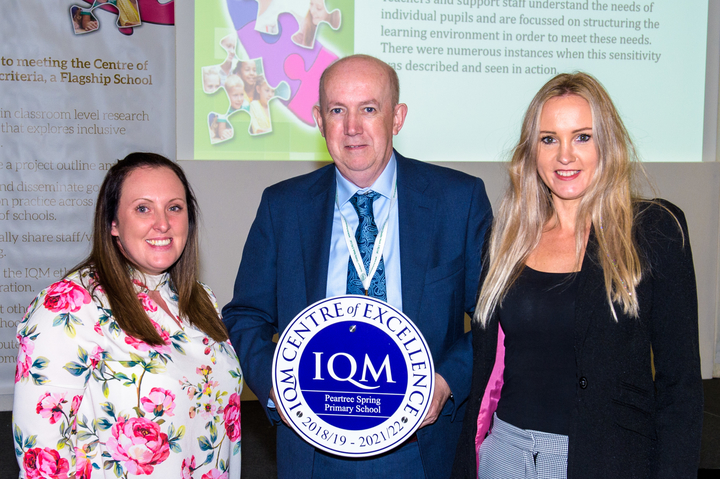Who is IQM?
IQM is the only national inclusion award in the UK. For over 20 years and in over 20 countries, schools, MATs and Local Authorities use the Inclusion Quality Mark to recognise exemplary inclusive practice.
Get in touch for your FREE school information pack today.
Peartree Spring Achieves Centre of Excellence Status
November 8, 2019

Peartree Spring Primary School in Hertfordshire achieves Centre of Excellence status.

Background
Peartree Spring is an unusually large Hertfordshire primary school with the capacity for three forms of entry. It currently has 619 pupils mostly living within the locality although some pupils travel some distance across the town to attend. Situated in the Shephall area of Stevenage, pupils come from diverse backgrounds with many experiencing significant deprivation and early life challenges. Originally there were separate Infant and Junior schools sharing the site but in 2014 the provision was remodelled to provide one large primary school. The current Headteacher led this period of change and improvement resulting in an extremely attractive, functional and child focussed environment. She is a strong and determined leader whose clarity of vision and quest for improvement has provided the local community with learning opportunities in a school with the highest expectations. At the same time, she is noted for her compassion and kindness. During the assessment days staff and parents spoke of the way she gives personal support to those in need. Staff feel highly valued and are proud to contribute to the school’s mission to ‘Learn, Believe and Achieve’
The Inclusion of All Pupils
The SENDCO prepared meticulously for the assessment and our conversations demonstrated her total focus on the inclusion of all pupils and especially those with the highest levels of need and deprivation. She is involved in several outreach programs which place the school at the centre, not only of the local school community, but as a recognised leading school for inclusion within the Hertfordshire Local Authority. Peartree Spring is the Lead School in Stevenage for ‘Delivering Special Provision Locally’ (DSPL) and as such the SENDCO works closely with a range of professionals to ensure that the needs of every child in the town are identified. As the capacity of the Local Authority has reduced over time, the work of such groups has become vital for the well-being of the most vulnerable children. The SENDCO also serves on various assessment panels assisting the allocation of Exceptional Needs Funding (ENF) and the provision of Education Health Care Plans (EHCPs).
A Positive Approach to Inclusion
The refurbishment of buildings at Peartree Spring has provided an impressive space for staff training and collaborative meetings between schools across the town and beyond. The SENDCO maximises opportunities to share the attractive space in order to provide high quality professional development (CPD) within an attractive and comfortable setting. The Local Authority has recently announced that Peartree Spring will be managing the local Primary Support Base (PSB) which is to be relocated by January 2020. The base will respond to needs of primary pupils at risk of exclusion and by leading the project the school will further influence a positive approach to inclusion.
A Sense of Belonging
Because of the size of the school senior leaders are very aware of the importance of each year group having its own identity and that the needs of pupils are known and understood. Year group leaders are responsible for managing their own teaching and support team ensuring that every pupil is included and has a sense of belonging. The carefully structured leadership (SLT) and management (SMT) teams ensure that roles and responsibilities are clearly defined and that there is a strong sense of common purpose.
Identifying Needs Early
During the assessment I met with a visiting Advisory Teacher for pupils on the autistic spectrum (ASD). She affirmed the thorough and skilful way in which the staff at the school identify needs early and then work closely with her to ensure the most effective support for all pupils on the spectrum.
Supporting Individual Needs
The commitment to inclusion and the understanding of the complexities of this commitment are expressed by all and demonstrated by the high level of practice. Teachers and support staff understand the needs of individual pupils and are focussed on structuring the learning environment in order to meet these needs. There were numerous instances when this sensitivity was described and seen in action; for example, a pupil, who for emotional reasons was unable to speak, was taught in a private area within the classroom. Gradually and over a long period of time the supporting adult was able to increase the pupil’s confidence so that another pupil was also accepted within that private area. Conversation began with odd words being spoken until the pupil in need was able to communicate effectively with special friends; the pupil then became reintegrated fully into the classroom environment. Such success stories were frequently described and I saw at first hand a pupil with a speech and language disorder being taught (using a computer program) before school started. Similarly, pupils with visual and hearing impairment and other diagnosed disabilities are well supported and fully integrated within the learning environment.
High Quality Learning Environment
The assessment took place at the very end of the Summer Term when one might expect to see the physical environment changing in preparation for the Summer break. This was not the case as the vibrant displays of children’s work gave a stunning impression of the respect for the hard work of pupils and staff. One teacher explained that the high-quality environment was maintained until the very end of term so that pupils could feel secure within the exciting environment that was their learning space. The outdoor space is similarly spacious and colourful providing a beautiful haven in what is a heavily populated area of Stevenage. The work of the site management team must be commended as the environment (both inside and out) shows great attention to detail providing a most attractive learning and working environment.
Planning a Revised Curriculum
Plans for the implementation of a revised curriculum in September are well developed and the teacher responsible has involved the whole staff team as well as pupils in this review and planning process. Learning values have been collaboratively agreed and reflect and build on the school’s mission statement. The values include reference to resilience, risk-taking, creativity and good citizenship which are frequently referred to during lessons to encourage pupils to take responsibility for their own attitude to learning.
Positive Pupils
Pupils were represented by the School Council during the assessment and individuals spoke very positively about their learning experiences. The behaviour of pupils is exemplary and reflects and endorses the high expectations of staff. The Behaviour Policy is a ‘living’ document giving practical advice and reminders about how to support pupils with additional needs.
Parents Spoke Extremely Positively
Parents of pupils in the school spoke extremely positively about the school and as well as commending the classroom practitioners and the SENDCO, appreciate the significant work carried out by the Family Liaison Workers (FLWs). Children and families in need are identified and supported in practical ways; those with the greatest need may gain support from the ‘Food Shed’, a local charity providing food donations. The FLWs work closely with designated staff for child protection and over time have developed excellent links with agencies that support pupils and families. They organise coffee mornings so that parents can stay in touch and parenting courses which address some of the pressures experienced by families. The FLWs frequently work with pupils on a one to one basis and provide a ‘safe space’ for pupils in need.
Highly Valued Office Staff
The Office staff are highly valued by all and parents find them to be friendly and approachable. They are happy to help parents access technology when necessary and sensitively support parents who have English as an additional language. The School Business Manager and the Office Manager are part of the Senior Leadership team and have played a significant role in establishing the financial well-being of the school.
Governors are Kept Well Informed
Governors are kept well informed about developments through the informative Governing Body meetings and visits to the school. They commended the school not only for its communication with themselves but also the communication with parents through curriculum maps and curriculum information evenings. The Headteacher’s Report to Governors gives them further insight into the successes and challenges of school leadership.
Newly Appointed SEND Governor
The Governor responsible for overseeing Special Educational Needs and Disability (SEND) is newly appointed; she is very aware of areas she would like to understand more clearly and is equally focussed on contributing to the inclusivity of the school. She was able to comment on areas of excellent practice such as the support given to a pupil following a bereavement and the one-to-one support given to another experiencing extreme anxiety. She is clear about her own ‘next steps’ as a Governor and hopes to learn more about the interventions used with SEND pupils.
Sources of Evidence
During the assessment days I met with a wide range of stakeholders including pupils, parents, teachers, support staff, and governors. The SENDCO was always at hand to clarify information. The success of the school is built on high expectations of achievement, team work, and a commitment to serve all members of the school community, especially the most vulnerable. These qualities are underpinned by the strong values and leadership of the Headteacher and govern the way pupils, staff, and parents respond to one another and reach out to the wider community.
Find out more about the IQM Inclusive School Award
If your school is interested in obtaining the IQM Inclusive School Award or you wish to talk to a member of the IQM team please telephone:
028 7127 7857 (9.00 am to 5.00 pm)
or email: info@iqmaward.com for further details.
Want more information on the IQM Award? Click here to request your free IQM information pack.
Other Posts

About IQM
The only national award for inclusion in the UK, IQM has been committed to recognising exemplary inclusive schools for over 20 years and in over 20 countries around the world. The three awards allow schools and organisations to celebrate their inclusive practice against nationally recognised framework.
Site Links
© 2026 Inclusion Quality Mark | website developed & cared for by digidoda


